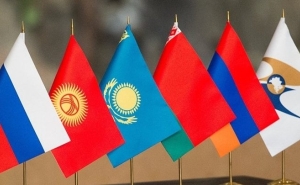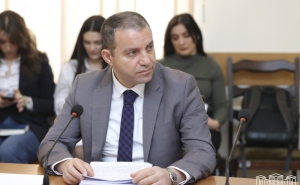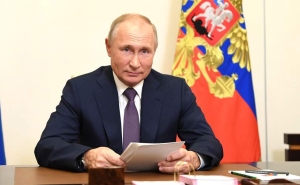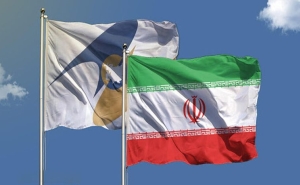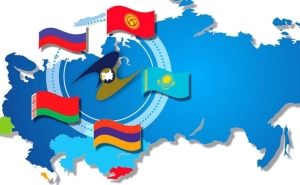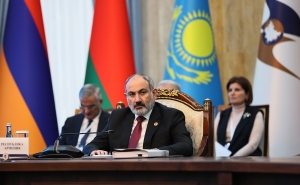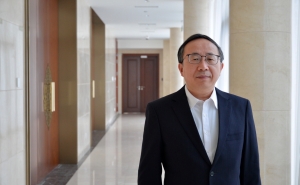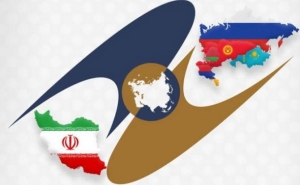The EAEU in the Context of Regional and Global Processes
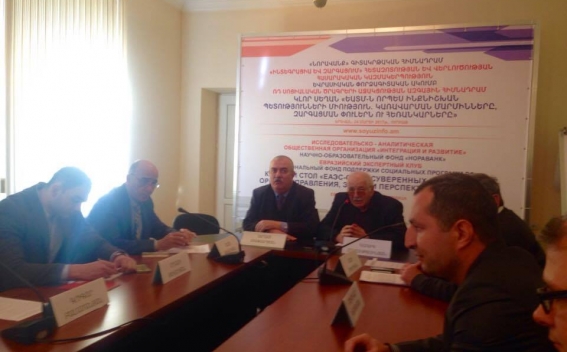
On March 24, a roundtable discussion was held at the Noravank Science and Education Foundation on the topic "EAEU - Union of Sovereign States: Government Agencies, Milestones and Prospects for Development." The tendencies of the development of the EAEU, the main benefits of Armenia's participation to the EAEU, the issues of harmonizing the legal systems of the member countries of the organization, etc were dscussed.
Reports were made by Grigory Balasanyan, candidate of economic sciences, associate professor of ASUE, member of the Eurasian Expert Club Ashot Tevikyan, associate professor of the Department of International Relations and Diplomacy of YSU, member of the Eurasian Expert Club, candidate of historical sciences, associate professor of the Eurasian Expert Club MarutVardazaryan and doctor of economic sciences, Professor, head of the author's team for the study of integration processes, a member of the Eurasian Expert Club Ashot Tavadyan.
The opening speech was made by the director of the Noravank Scientific and Educational Foundation Gagik Harutyunyan and the chairman of the NGO “Integration and Development” Aram Safaryan. Organizers of the round-table discussion are NGO "Integration and Development", the Noravank scientific and educational foundation, the Eurasian expert club and the National Fund for Support of Social Programs of the Russian Federation.
In his opening speech Gagik Harutyunyan noted that a lot has been said lately about possible alternatives to Eurasian integration. "There is always an alternative, but the question is how profitable it is for us," Harutyunyan said, stressing that it is important to have a detailed view of the EAEU before talking about alternatives and interests.
Aram Safaryan in his turn appealed to the students, masters and post-graduates studying in the field of international relations and world politics who participated in the roundtable, emphasizing the importance of such events as an opportunity to get acquainted with the expert scientific assessment of current processes.
In his report, Ashot Tevikyan presented the main institutions of the EAEU, their functions and role. "The bodies of the Union shall operate within the limits of the powers conferred upon them by the Treaty on the EAEU and international treaties within the Union.The chairmanship of the Supreme Council, the Intergovernmental Council and the Council of the Commission is carried out on a rotational basis in the Russian alphabet by one Member State during one calendar year without the right of prolongation,’’ Tevikyan noted.
Speaking about the issue of changing the legal system of the EAEU members after joining the union, Grigor Balasanyan noted that economic integration necessarily implies a convergence of the legal framework. "The timeliness of the formation of a new, Eurasian legal field protected from those norms of international law that have come into conflict with national legal systems was confirmed in case of Russian Federation." Russia and its partners in the CIS and the EAEU proved to be self-sufficient and fairly stable subjects of international law, and the Eurasian economy is quite legally protected from sanctions and other repressive measures", Balasanyan said. He stressed that for successful integration, a legal framework is needed that will include three components harmoniously complementing each other: the national legal level, harmonized with the legal acts of integration education, forming its second level and harmonizing the regional legal system with the global system of regulation of economic and trade relations.
Coming to the political component of Eurasian integration, Marut Vardazaryan noted that the process of Eurasian integration is an attempt to effectively counter emerging threats. "Eurasian integration, being an economic process, is closely connected with security," Vardazaryan said adding: "The implementation of integration projects can be successful only if there is a favorable combination of the characteristics of the economic and political system of the member countries." The possibility of implementing a unified policy in case of crises plays a fundamental role in integration projects, which presupposes a similar reaction of member countries’ economies on external macroeconomic processes, and the role of security priorities in the implementation of integration projects. An economic integration plan cannot be implemented at the expense of security interests."
Summarizing the results of the round table, Ashot Tavadyan spoke about the combination of global and integration processes and their economic component. "Globalization and regional integration can be instruments for achieving faster economic growth rates, depending on which specific mechanisms and factors they both depend as development conductors." Globalization expands opportunities for export-import operations, technology exchange, while the regional economy, for example, at the same time can generate effects that contribute to economic growth by reducing transport costs and various optimizations of interaction between market actors."
The expert expressed the opinion that regionalization in Eurasian territory, as practice shows, becomes more adequate economic policy than globalization. "The formation of a unified regional economy implies not only the creation of unified governing bodies and coordination of actions of the countries participating in Eurasian economic integration, but also the transfer of all national economies to fundamentally new rails, that is their reorientation to the internal Eurasian market," Tavadyan concluded.
Experts also agreed that cooperation between various integration unions, including the EU and the EAEU, is of great importance, and the policy of combining the two integration vectors adopted by Armenia can give some certain results.
Other materials on this subject
- EAEU to become one of key centers of Greater Eurasian Partnership, says Putin "Our integration may play the role of one of the key centers of the Greater Eurasian Partnership formation," the president added.
- Russia ratifies protocol on requirements for length of service of EEU bodies' employees for pensions The corresponding law was signed by Russian President Vladimir Putin. The document was published on the official Internet portal of legal information.
- We have reached significant achievements in the development process of the EAEU- Nikol Pashinyan A large single market has been created, the mutual trade figures have increased considerably.
- Russia ratifies agreement on simplification of payments for goods’ transit within EAEU territory The aforesaid agreement will be applied in the event that the goods are subject to the procedure of customs transit in one EEU member country, whereas customs and other payments in another.
- EAEU Countries Discuss Creating Eurasian Agency for Strategic Initiatives The issue has been discussed by the economy ministers of the Union’s member states and has been presented to the Eurasian Economic Commission in the platforms of the Eurasian Inter-governmental Council.
-
 17:08
17:08The regular session of the Anti-corruption Policy Council takes place in Jermuk
-
 15:05
15:05The Prime Minister sends congratulatory messages to the supreme leader of Iran and the President of Iran
-
 11:11
11:11Armenia sends earthquake aid to Turkey
-
 10:43
10:43Commemoration of the Pontiff St. Sahak Partev
-
 09:16
09:16Some roads are closed and difficult to pass in Armenia
-
 19:55
19:55Phone conversation of the Foreign Minister of Armenia with the U.S. Assistant Secretary of State for European and Eurasian Affairs
-
 18:30
18:30Prime Minister Pashinyan and President Khachaturyan meet
-
 18:20
18:20Ararat Mirzoyan with Co-Chairman of the OSCE Minsk Group of France Brice Roquefeuil
-
 17:01
17:01Humans could land on Mars within 10 years, Musk predicts
-
 16:45
16:45France, US urge 'immediate' end to Nagorno Karabakh blockade
-
 16:01
16:01Blockaded Nagorno Karabakh launches fundraiser to support quake-hit Syria
-
 15:59
15:59Earthquake death toll in Turkey rises to 18,342
-
 15:43
15:43Ararat Mirzoyan Held a Telephone Conversation with Sergey Lavrov
-
 15:06
15:06French president rules out fighter jet supplies to Ukraine in near future
-
 14:47
14:475 Day Weather Forecast in Armenia
-
 14:44
14:44President Vahagn Khachaturyan wrote a note in the book of condolences opened in the Embassy of Syria in Armenia
-
 14:20
14:20Azerbaijan’s provocations impede establishment of peace and stability – Armenian FM tells Russian Co-Chair of OSCE MG
-
 12:57
12:57France representation to OSCE: Paris calls on Azerbaijan to restore freedom of movement through Lachin corridor
-
 11:40
11:40Command of Kosovo forces highly appreciated preparation of Armenian peacekeepers
-
 10:16
10:16The United States withdrew from sanctions against Syria for six months the provision of assistance after the earthquake
day
week
month
Humidity: %
Wind: km/h


